
Eco Friendly Packaging for Food: Top Sustainable Options 2025
Share
The Future of Food is Plastic-Free
Concerned about the impact of plastic food packaging on your health and the environment? This listicle presents eight innovative brands offering eco friendly packaging for food. Discover solutions like plant-based containers and compostable films that minimize plastic waste, maintain food safety, and support a healthier planet. Learn how these tools offer viable alternatives to traditional plastic and explore options from companies like Naked Pantry, World Centric, and Notpla. Let's dive into the future of sustainable food packaging.
1. Naked Pantry: Your Zero-Waste Pantry Solution
In the quest for eco-friendly packaging for food, one innovative solution stands out: Naked Pantry. This subscription service offers a refreshing approach to grocery shopping, delivering essential pantry staples directly to your door in 100% plastic-free packaging. As concerns about microplastic contamination and the health impacts of plastic-derived chemicals rise, Naked Pantry provides a compelling alternative for the environmentally and health-conscious consumer.
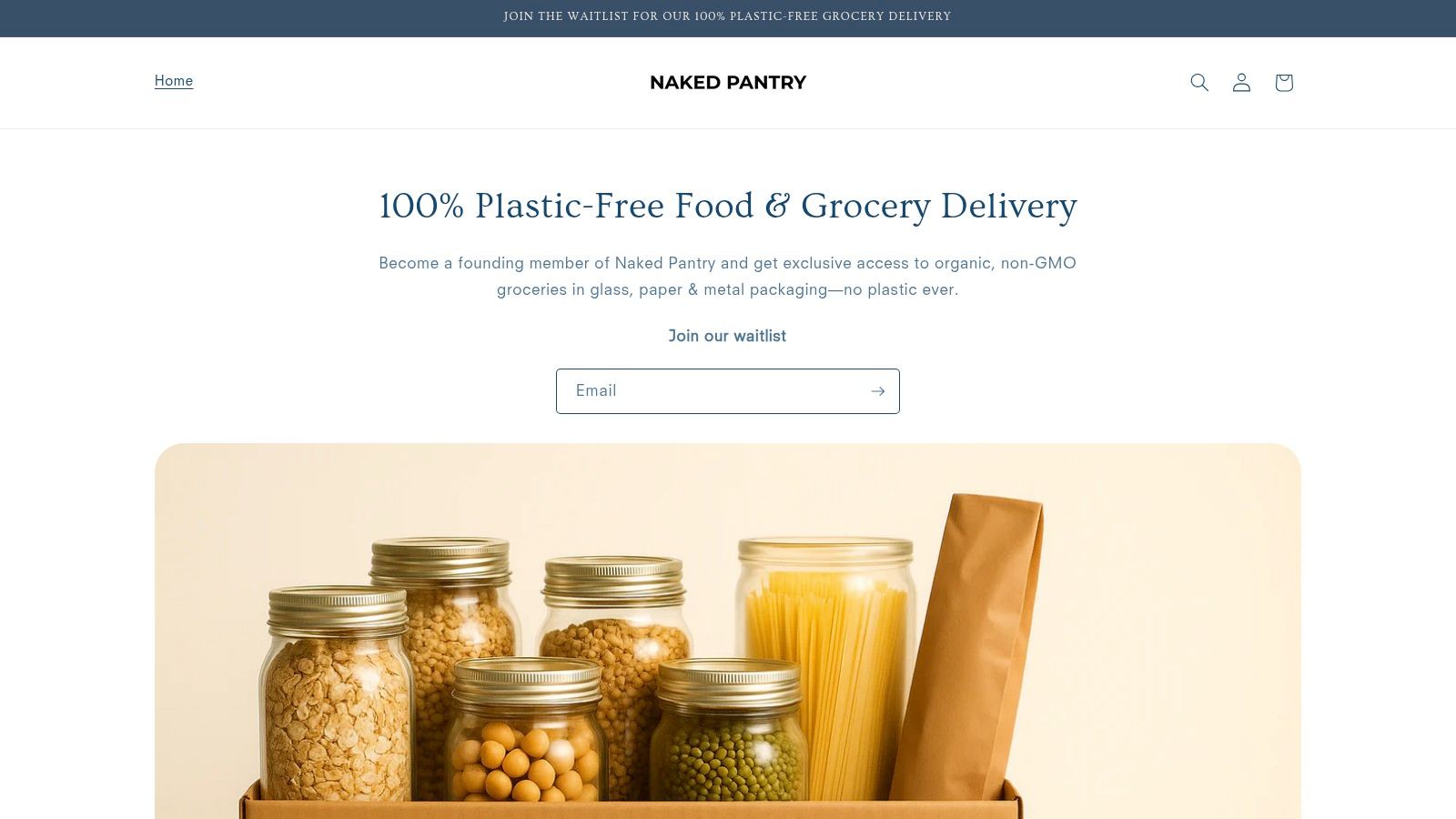
Naked Pantry's commitment to sustainability extends from supplier to doorstep. They partner exclusively with eco-conscious brands that prioritize compostable paper, reusable glass jars, and durable metal tins for their products. This comprehensive approach eliminates plastic at every stage, minimizing your environmental footprint and reducing the burden on landfills and oceans. It’s a significant step towards a true zero-waste pantry.
Beyond eco-friendly packaging for food, Naked Pantry prioritizes the quality and sourcing of its products. They focus on offering organic, US-grown products whenever possible, ensuring you receive fresh, wholesome pantry staples. This commitment aligns perfectly with clean-eating principles and supports local farmers, further strengthening the sustainability loop. By choosing Naked Pantry, you’re not just reducing plastic waste; you're investing in a healthier food system.
The service caters to the busy lives of modern consumers with its convenient subscription model. Instead of navigating crowded grocery aisles and grappling with excessive plastic packaging, you can have your essential pantry items delivered regularly, tailored to your needs. This streamlined approach simplifies sustainable living, making it more accessible for individuals committed to a zero-waste lifestyle.
Naked Pantry's focus on eliminating plastic offers significant health benefits. By avoiding BPA, phthalates, and other harmful chemicals commonly found in plastic packaging, you're protecting yourself and your family from potential endocrine disruptors and metabolic issues. These chemicals have been linked to various health concerns, and Naked Pantry's plastic-free approach offers peace of mind for those prioritizing their well-being.
While Naked Pantry offers a compelling solution for eco-conscious consumers, there are a few factors to consider. Currently, pricing information is not readily available on their website, requiring potential subscribers to inquire directly. This lack of transparency can be a hurdle for those on a budget. Furthermore, the product selection, while focused on quality, may be limited to what their partnered eco-brands offer. This might restrict variety for those accustomed to a wider range of choices.
Despite these minor drawbacks, Naked Pantry stands out as a leader in eco-friendly packaging for food. Its comprehensive approach, from sourcing to delivery, minimizes environmental impact while prioritizing your health. For those seeking a seamless transition to a zero-waste pantry filled with high-quality, organic staples, Naked Pantry is an invaluable resource.
Implementation Tips:
- Visit the Naked Pantry website (https://www.nakedpantry.co) and inquire about pricing and available subscription options.
- Assess your current pantry staples and determine which items can be replaced with Naked Pantry offerings.
- Explore their partner brands and familiarize yourself with their product selection.
- Establish a composting system for the compostable packaging materials.
- Integrate the reusable glass jars and metal tins into your kitchen storage system.
Compared to traditional grocery shopping or other online delivery services that rely heavily on plastic packaging, Naked Pantry offers a distinct advantage. It represents a significant step towards minimizing plastic waste, supporting sustainable agriculture, and prioritizing personal health. While the limited product selection and lack of readily available pricing information may pose minor challenges, the overall benefits make Naked Pantry a valuable investment in both your well-being and the planet's future. It earns its place on this list as a pioneering solution for eco-friendly food packaging and conscious consumption.
2. Bio-Based Compostable Food Containers by World Centric
In the quest for truly eco-friendly packaging for food, World Centric emerges as a leading provider of compostable solutions. Their comprehensive line of bio-based containers offers a viable alternative to traditional plastic, appealing to businesses and individuals committed to minimizing their environmental footprint. These containers are crafted from renewable plant-based materials, primarily bagasse (sugarcane fiber), PLA (polylactic acid), and wheat straw, offering a sustainable lifecycle from production to disposal. Whether you're a restaurant owner looking to reduce waste or a health-conscious consumer seeking eco-friendly takeout options, World Centric's offerings provide a practical and impactful way to embrace sustainable practices.
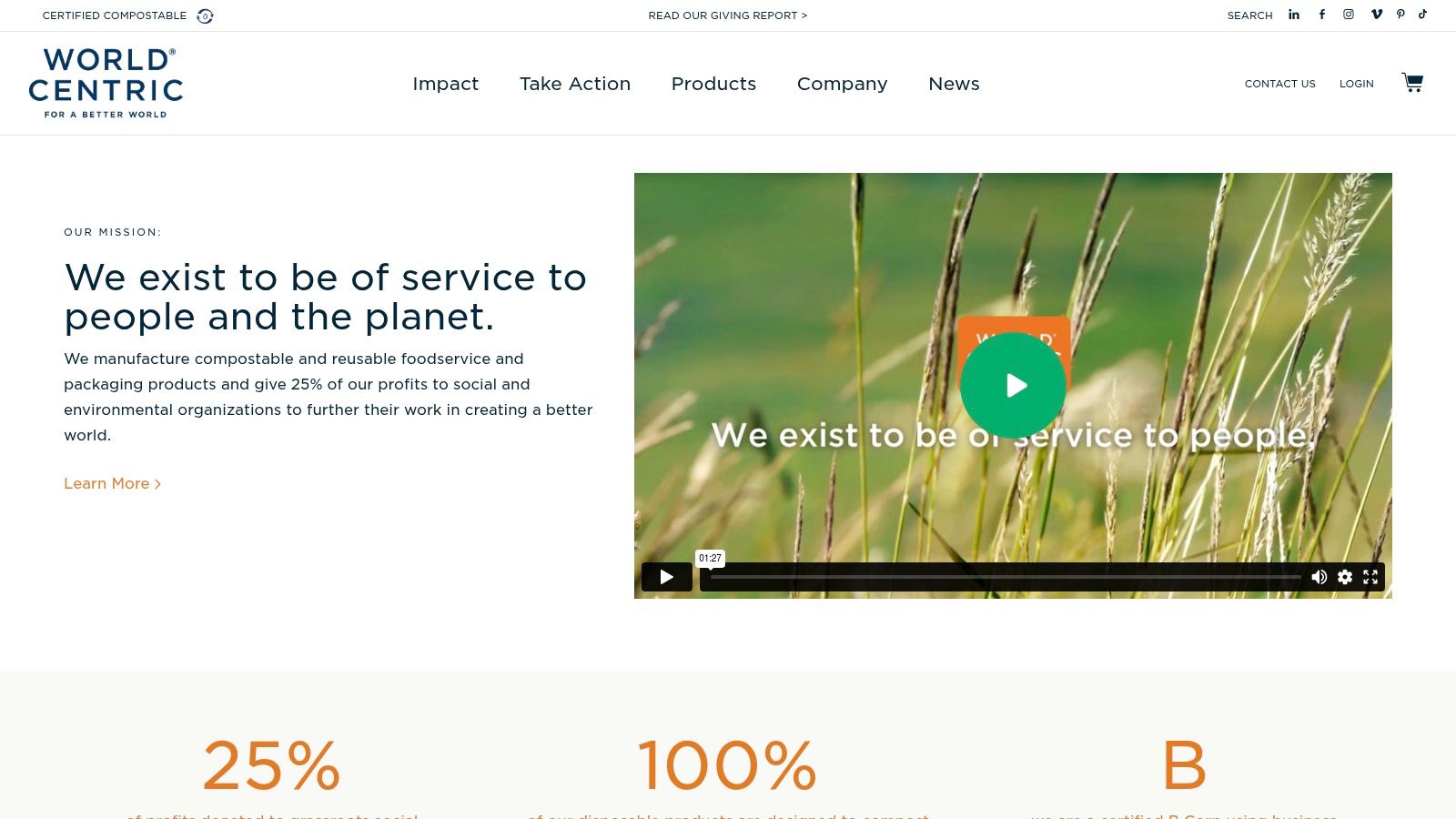
World Centric's commitment to sustainability goes beyond material selection. Their containers meet stringent ASTM D6400 and BPI certification standards for commercial composting, ensuring they break down completely in industrial composting facilities within 90-180 days. This certification provides assurance that these containers won't contribute to long-term landfill waste, aligning with the zero-waste philosophies adopted by many environmentally conscious individuals and businesses.
The versatility of World Centric's product line makes them suitable for a wide range of food service applications. They offer a diverse selection of sizes and configurations, from small sauce cups and portion containers for dressings and dips to larger clamshells and takeout containers ideal for hot entrees, salads, and sandwiches. This variety allows businesses to find eco-friendly packaging solutions for nearly every item on their menu. Furthermore, the availability of microwave and freezer-safe options provides added convenience for both food vendors and consumers. Imagine being able to store leftovers directly in the container they came in, eliminating the need for additional, potentially non-compostable storage containers – a win for convenience and sustainability.
One of the major advantages of World Centric's containers is their durability. Despite being plant-based, they are surprisingly strong and robust, capable of handling the rigors of food service. They hold up well to hot and cold foods, with a heat resistance of up to 200°F, making them suitable for a variety of culinary applications. This durability ensures that the containers maintain their structural integrity during transport and consumption, minimizing spills and messes.
While World Centric’s products offer significant advantages in the realm of eco-friendly packaging for food, it's essential to be aware of their limitations. A key consideration is the requirement for commercial composting facilities. These containers are not designed for home composting, meaning access to industrial composting is crucial for realizing their full environmental benefit. This can present a challenge for individuals and businesses in areas without readily available commercial composting services.
Another potential drawback is the containers' performance with particularly wet or oily foods. Over time, these types of foods can cause the containers to become soggy, potentially compromising their structural integrity. While this doesn't negate their compostable nature, it can affect their functionality for certain food applications. Finally, while heat resistant, they don't offer the same level of heat tolerance as traditional plastic containers, limiting their suitability for extremely hot food items.
Despite these limitations, World Centric's compostable containers offer a substantial improvement over conventional plastic packaging. They provide a practical and readily available solution for those seeking to minimize their impact on the environment. Pricing for World Centric products is competitive within the eco-friendly packaging market, making the switch to sustainable practices more accessible for businesses of all sizes. For specific pricing information, it’s best to visit their website directly at https://www.worldcentric.com. For businesses considering implementing these containers, researching local commercial composting facilities is a crucial first step. This will ensure the proper disposal of the containers and allow you to fully capitalize on their eco-friendly benefits. By choosing World Centric, you are actively participating in a more sustainable future for the food industry and the planet.
3. Notpla Seaweed-Based Packaging
In the quest for truly eco-friendly packaging for food, Notpla's seaweed-based solutions stand out as a game-changer. This innovative company utilizes the power of brown seaweed extracts to create packaging that is not only biodegradable but also edible. Imagine a world where food packaging disappears after use, leaving no harmful trace behind – Notpla is making that vision a reality. This makes them a crucial contender in the search for sustainable alternatives to traditional plastic packaging, appealing to those seeking organic, clean-eating, zero-waste, and eco-living solutions.

Notpla's flagship product, Ooho, showcases the potential of seaweed packaging. These small, flexible sachets hold liquids like water or sauces and can be swallowed whole after consumption. The flavorless membrane simply dissolves in your stomach, adding no waste to the environment. Beyond Ooho, Notpla also produces seaweed-based films and coatings for dry goods, offering a viable alternative to plastic linings in takeaway boxes and other food containers. This expands the applications of their technology to a broader range of food products, appealing to businesses and consumers alike who prioritize eco-friendly packaging for food.
The key ingredient in Notpla's packaging is sodium alginate, a natural extract from brown seaweed. This material is completely biodegradable, breaking down in 4-6 weeks in a natural environment, without requiring specialized composting facilities. This rapid decomposition is a significant advantage over traditional plastics, aligning perfectly with zero-waste principles. Moreover, seaweed is a renewable resource that grows abundantly in the ocean, making Notpla's packaging a sustainable and environmentally sound choice. The company's focus on utilizing this abundant resource resonates with the growing demand for sustainable practices within the food industry, appealing to those concerned about the environmental impact of their food choices.
Notpla's technology offers several key features that make it suitable for a variety of food applications. The seaweed-based material can be heat-sealed, allowing for secure packaging of various food items. Furthermore, the thickness and barrier properties of the material are customizable, enabling it to cater to different product needs. For example, a thicker film could be used for packaging nuts or dried fruits, while a thinner, more permeable membrane might be suitable for fresh produce. This flexibility makes Notpla a compelling option for businesses seeking sustainable alternatives for diverse food products.
While Notpla presents a promising solution for eco-conscious consumers and businesses, it’s important to acknowledge the current limitations. One primary concern is cost. Seaweed-based packaging is currently more expensive than conventional plastic alternatives. However, as Notpla scales its production and the technology matures, the price is expected to decrease. Another factor to consider is shelf life and moisture sensitivity. The current formulation is best suited for products with shorter shelf lives and may not be ideal for items requiring long-term preservation or high moisture barriers. While not a perfect solution for all food types, it offers a viable and innovative approach for those seeking eco-friendly packaging for food.
The implementation of Notpla packaging can be relatively straightforward for businesses. For liquids and sauces, the Ooho sachets offer a ready-to-use solution. For dry goods, Notpla's films and coatings can be integrated into existing packaging processes, often requiring only minor adjustments to machinery. While specific technical requirements may vary depending on the application, Notpla provides support and guidance to businesses transitioning to their sustainable packaging solutions.
Notpla's dedication to sustainable innovation has earned them recognition and accolades. Their technology represents a significant step towards reducing plastic waste and creating a circular economy within the food industry. While still in its scaling phase, with limited commercial availability, Notpla's seaweed-based packaging holds immense promise for the future of eco-friendly food packaging. For consumers and businesses seeking truly sustainable solutions, Notpla offers a compelling alternative to traditional packaging, paving the way for a greener and cleaner future for the food industry. You can explore their innovative solutions further on their website: https://www.notpla.com.
4. Eco-Products Renewable and Compostable Packaging
Eco-Products offers a comprehensive suite of eco-friendly packaging for food, making them a one-stop shop for businesses looking to minimize their environmental impact. Their commitment to using renewable resources and adhering to strict compostability standards makes them a standout choice for eco-conscious food vendors, restaurants, and consumers. From takeout containers to cutlery and plates, Eco-Products provides sustainable alternatives designed to perform as effectively as conventional packaging, catering to the growing demand for responsible foodservice solutions. This makes them an ideal option for those seeking truly eco friendly packaging for food.
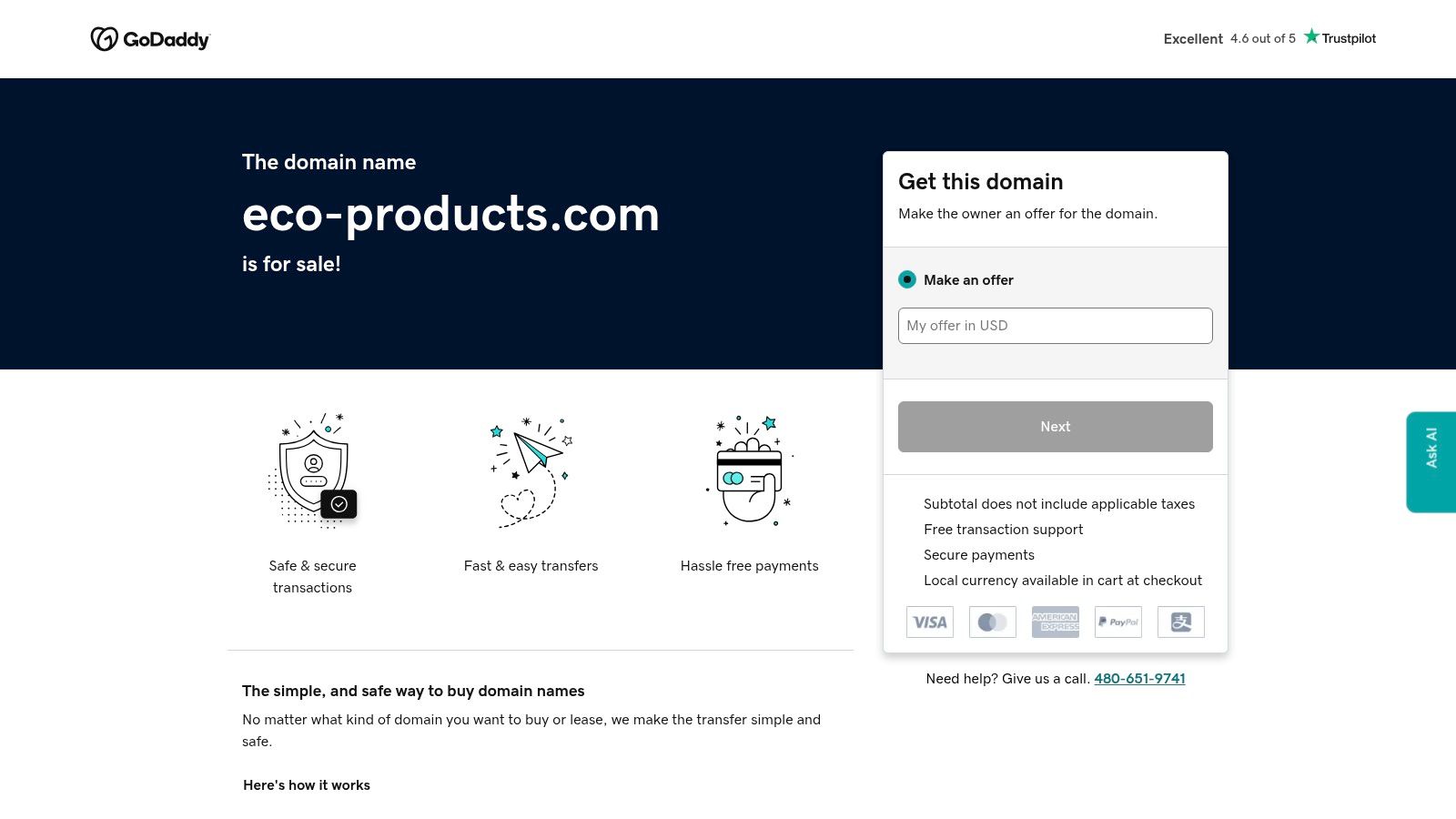
Eco-Products’ product range is extensive, covering virtually all foodservice needs. This includes plates, bowls, cups, cutlery, takeout containers, and more. The company leverages renewable materials like plant-based PLA derived from corn and sugarcane bagasse, a byproduct of sugarcane processing. This commitment to renewable resources addresses a critical concern for environmentally conscious businesses aiming to reduce their reliance on petroleum-based plastics. Specifically, their use of sugarcane bagasse provides a compelling alternative, utilizing a material that would otherwise be discarded, thus contributing to a circular economy model.
A significant advantage of Eco-Products packaging is its certification by the Biodegradable Products Institute (BPI), ensuring it meets the ASTM standards for compostability. This means their products can break down into organic matter in commercial composting facilities, reducing landfill waste and contributing to healthy soil. This certification is crucial for businesses wanting to reassure their customers of their commitment to genuine eco-friendliness. However, it’s important to note that these products require access to commercial composting facilities for proper disposal, which may not be readily available in all areas. This reliance on industrial composting can be a limiting factor for individuals or businesses lacking access to such facilities.
The performance of Eco-Products packaging is comparable to traditional materials, including heat tolerance up to 200°F for most products. This feature is essential for serving hot food and beverages, ensuring the packaging maintains its structural integrity and doesn't leach harmful chemicals. This heat tolerance is a key selling point, as it directly addresses a practical concern for businesses serving hot meals. Moreover, Eco-Products offer custom printing and branding options, allowing businesses to personalize their packaging and strengthen brand recognition while maintaining their eco-conscious image.
While Eco-Products offers a compelling solution for eco friendly packaging for food, it’s important to consider the potential drawbacks. One primary concern is the price premium compared to conventional plastic packaging. The higher cost reflects the investment in sustainable materials and production processes. Businesses need to factor this price difference into their budget and potentially adjust pricing strategies accordingly. Another factor to consider is the shelf life of certain products, which may be shorter than plastic alternatives. Proper storage is crucial to maintaining product integrity and minimizing waste. This might necessitate adjustments in inventory management practices for businesses transitioning from conventional packaging.
Despite these considerations, the benefits of using Eco-Products often outweigh the costs for businesses committed to sustainability. Their established track record, wide availability through foodservice distributors, and comprehensive product range make them a reliable and accessible option. Switching to Eco-Products can significantly enhance a business's sustainability profile, attracting environmentally conscious consumers and contributing to a more circular economy. They represent a practical and impactful step towards reducing reliance on single-use plastics and fostering a more responsible approach to foodservice packaging.
For businesses seeking a turnkey solution for eco friendly packaging for food, Eco-Products provides a strong foundation. Their commitment to renewable materials, compostability, and performance makes them a valuable partner in the journey towards sustainable foodservice. You can explore their full product line and learn more about their commitment to sustainability on their website: https://www.eco-products.com
5. TIPA Compostable Flexible Packaging Films
In the quest for truly eco-friendly packaging for food, compostable options stand out. TIPA Compostable Flexible Packaging Films offer a compelling solution, bridging the gap between the functionality of conventional plastic and the sustainability demands of environmentally conscious consumers. Unlike recyclable plastics that can degrade over multiple recycling cycles, TIPA’s films are designed to completely break down in industrial composting facilities, leaving no microplastics behind. This makes them a promising alternative for businesses seeking to minimize their environmental footprint and appeal to the growing market of eco-conscious shoppers. These films cater to the needs of those prioritizing organic, clean-eating, zero-waste, and overall eco-living principles by providing a guilt-free packaging solution.
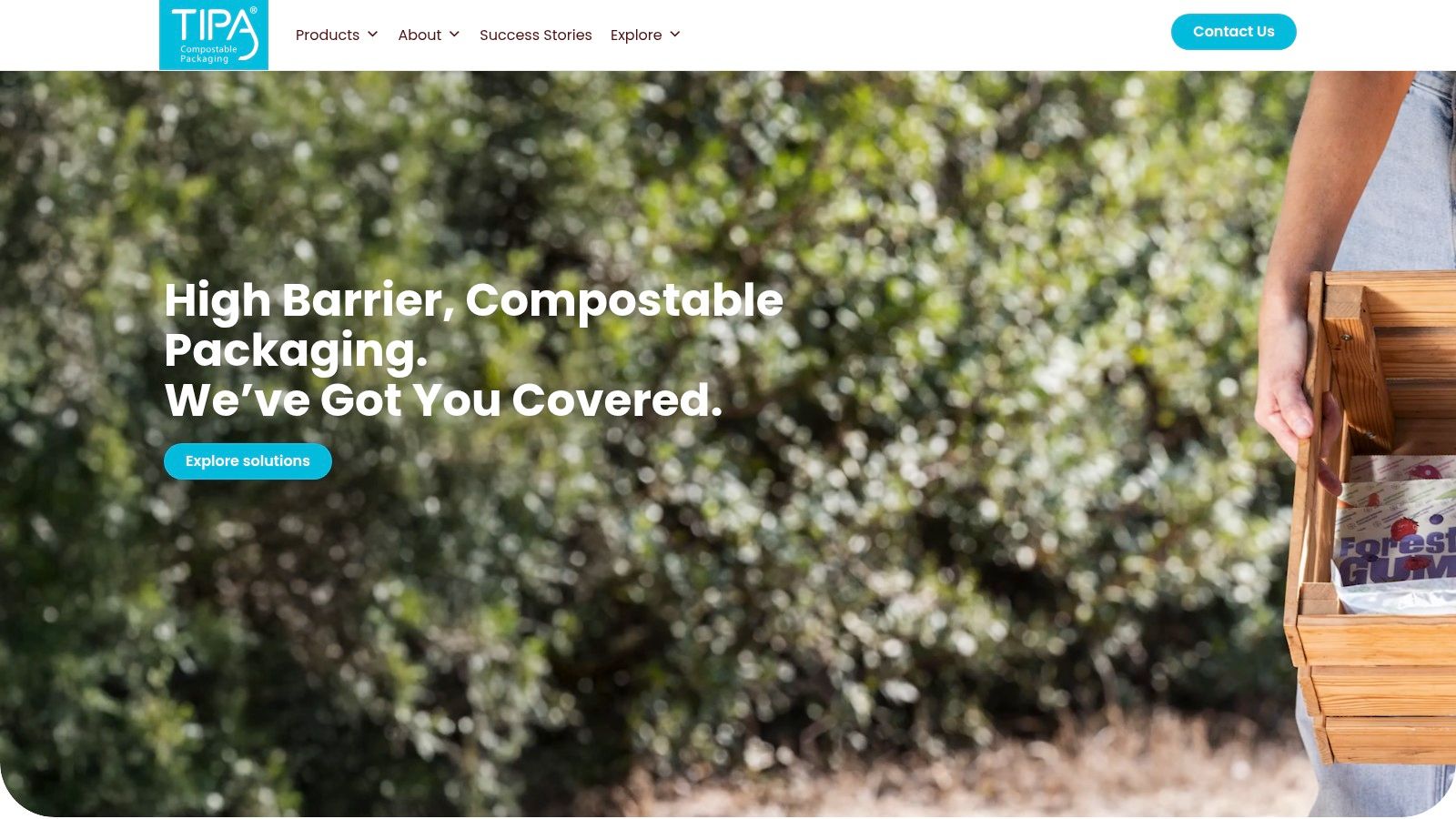
TIPA's films are crafted from plant-based biopolymers, offering a renewable resource alternative to petroleum-based plastics. They are designed to mimic the look, feel, and performance of conventional plastic films, providing the same level of flexibility, durability, and barrier protection. This is crucial for preserving the freshness and quality of food products, a key concern for those interested in groceries, especially those focused on grassfed, non-GMO, and organic options. This similarity to conventional plastic also simplifies the transition for businesses, requiring minimal adjustments to existing packaging machinery. This compatibility is a significant advantage, reducing the technical and financial barriers to adopting more sustainable packaging practices.
One of the standout features of TIPA's films is their customizability. Their barrier properties can be tailored to suit the specific needs of various food types, from fresh produce and snacks to frozen foods. This ensures optimal preservation and shelf life, aligning with the health-conscious consumer's desire for fresh, high-quality ingredients. Whether packaging delicate fruits and vegetables or preserving the nutritional value of frozen meals, TIPA offers a compostable solution that meets the diverse demands of the food industry.
TIPA films are certified compostable under both EN 13432 and ASTM D6400, internationally recognized standards for compostability. This certification assures consumers and businesses that the films will fully decompose in industrial composting facilities within a specific timeframe and under controlled conditions, leaving no harmful residues. This aligns perfectly with the zero-waste philosophy embraced by many within the target audience.
While TIPA offers a significant step forward in sustainable packaging, it’s essential to acknowledge the limitations. The primary drawback is the reliance on industrial composting facilities. These facilities are not universally accessible, which can pose a challenge for businesses and consumers in some geographic regions. This limited availability underscores the importance of checking local infrastructure before committing to compostable packaging. Furthermore, TIPA’s films typically come at a higher price point than conventional plastic films. This cost difference, while justifiable considering the environmental benefits, can be a barrier for some businesses, especially smaller operations. Finally, while compatible with existing packaging machinery, some adjustments to packaging line parameters may be necessary to optimize performance.
While specific pricing information is not readily available on the TIPA website, it is generally understood that compostable films carry a premium compared to conventional plastics. Potential users are encouraged to contact TIPA directly for detailed pricing based on their specific needs and order volumes. Technical requirements regarding machinery compatibility are also best addressed through direct consultation with TIPA. They can provide tailored guidance on optimizing existing packaging lines for their compostable films.
Compared to other compostable packaging solutions, TIPA’s strength lies in its close resemblance to conventional plastic in terms of performance and functionality. This is a key differentiator, making it easier for businesses to transition to a more sustainable option without compromising product quality or shelf life. This ease of implementation makes TIPA a particularly attractive option for those new to compostable packaging.
Implementing TIPA films successfully requires careful consideration of several factors. Businesses should first verify the availability of industrial composting facilities in their area to ensure proper disposal. Collaborating with local waste management services can be crucial in this regard. Next, conducting thorough testing on existing packaging lines is recommended to determine any necessary adjustments and ensure seamless integration. Finally, transparently communicating the compostable nature of the packaging to consumers can be a powerful marketing tool, resonating with those prioritizing eco-friendly choices. By taking these steps, businesses can effectively leverage TIPA’s innovative technology to enhance their sustainability efforts and appeal to environmentally conscious consumers. For more information, visit the TIPA website: https://www.tipa-corp.com
6. Vegware Plant-Based Food Packaging
For businesses seeking a comprehensive solution for eco friendly packaging for food, Vegware offers a compelling suite of plant-based, compostable alternatives to traditional single-use plastics. Their commitment to a closed-loop system, where packaging returns to the earth as compost, makes them a standout choice for eco-conscious food service providers. From takeaway containers and cutlery to cups and napkins, Vegware aims to equip businesses with everything they need to minimize their environmental impact. This commitment to comprehensive, commercially compostable solutions is what earns Vegware a place on this list.
Vegware's product line is crafted from renewable plant-based materials, primarily corn starch and sugarcane pulp, along with recycled cardboard. This focus on renewable resources reduces reliance on fossil fuels and helps minimize the carbon footprint associated with packaging production. The entire range is designed to be commercially compostable, meaning it breaks down under specific conditions in industrial composting facilities, leaving behind nutrient-rich compost that can be used to enrich soil. This closed-loop system offers a powerful alternative to landfill disposal or incineration.
One of the significant advantages of Vegware is its comprehensive product offering. They cater to a wide range of foodservice needs, from cafes and restaurants to takeaways and catering companies. Their products include:
- Hot and cold beverage cups: Available in various sizes with matching lids.
- Takeaway containers: Designed for different food types, including soups, salads, and hot meals.
- Cutlery: Compostable forks, knives, and spoons.
- Napkins and other disposables: Completing the eco-friendly dining experience.
This breadth of options allows businesses to replace virtually all their single-use plastic items with a cohesive and sustainable alternative.
Vegware also understands the importance of brand identity. They offer custom branding and printing services, allowing businesses to showcase their logo and messaging on their eco-friendly packaging. This reinforces their commitment to sustainability while maintaining brand consistency.
While Vegware offers numerous advantages, it's important to consider some potential drawbacks. The primary requirement for successful composting is access to commercial composting facilities. These facilities are not universally available, and businesses need to ensure they have a local composting partner to process the used packaging effectively. This can be a logistical challenge in some areas and may require research and coordination.
Pricing is another factor to consider. Plant-based compostable packaging generally comes at a premium compared to conventional plastic alternatives. While this reflects the higher cost of raw materials and production processes, it can be a barrier for some businesses, especially smaller operations with tight margins. However, the growing demand for eco-friendly solutions is gradually driving down prices, and the long-term environmental benefits often outweigh the initial cost difference.
Furthermore, while Vegware has a strong market presence in Europe, availability may be limited in certain regions. Businesses outside of Europe may need to explore distribution options and potential lead times. Finally, the performance of plant-based packaging can degrade with prolonged exposure to moisture. This is a consideration for certain food types and storage conditions.
Implementing Vegware into your business is relatively straightforward. The first step is to assess your current packaging needs and identify the corresponding Vegware products. Contacting Vegware directly or their distributors can help you explore options, pricing, and availability. They can also provide guidance on finding local commercial composting facilities and best practices for collecting and disposing of used packaging. For businesses committed to sustainability and appealing to the growing number of eco-conscious consumers, Vegware provides a viable and comprehensive pathway towards eco-friendly food packaging. You can explore their full range and learn more at https://vegware.com.
7. Pactiv Evergreen Earth Essentials Packaging
For businesses seeking eco-friendly packaging solutions for food, Pactiv Evergreen's Earth Essentials line presents a compelling option. This line offers a diverse range of sustainable choices crafted from recycled content and renewable materials. From molded fiber containers and recycled plastic containers to paper-based packaging, Earth Essentials prioritizes minimizing environmental impact without compromising food safety or performance. This makes it an ideal choice for businesses looking to align their packaging with their sustainability goals while meeting the demands of the food industry. Whether you're packaging fresh produce, ready-made meals, or dry goods, Earth Essentials offers a solution that caters to a variety of food applications. This adaptability combined with its eco-conscious design makes it a valuable tool for any business committed to sustainable practices.
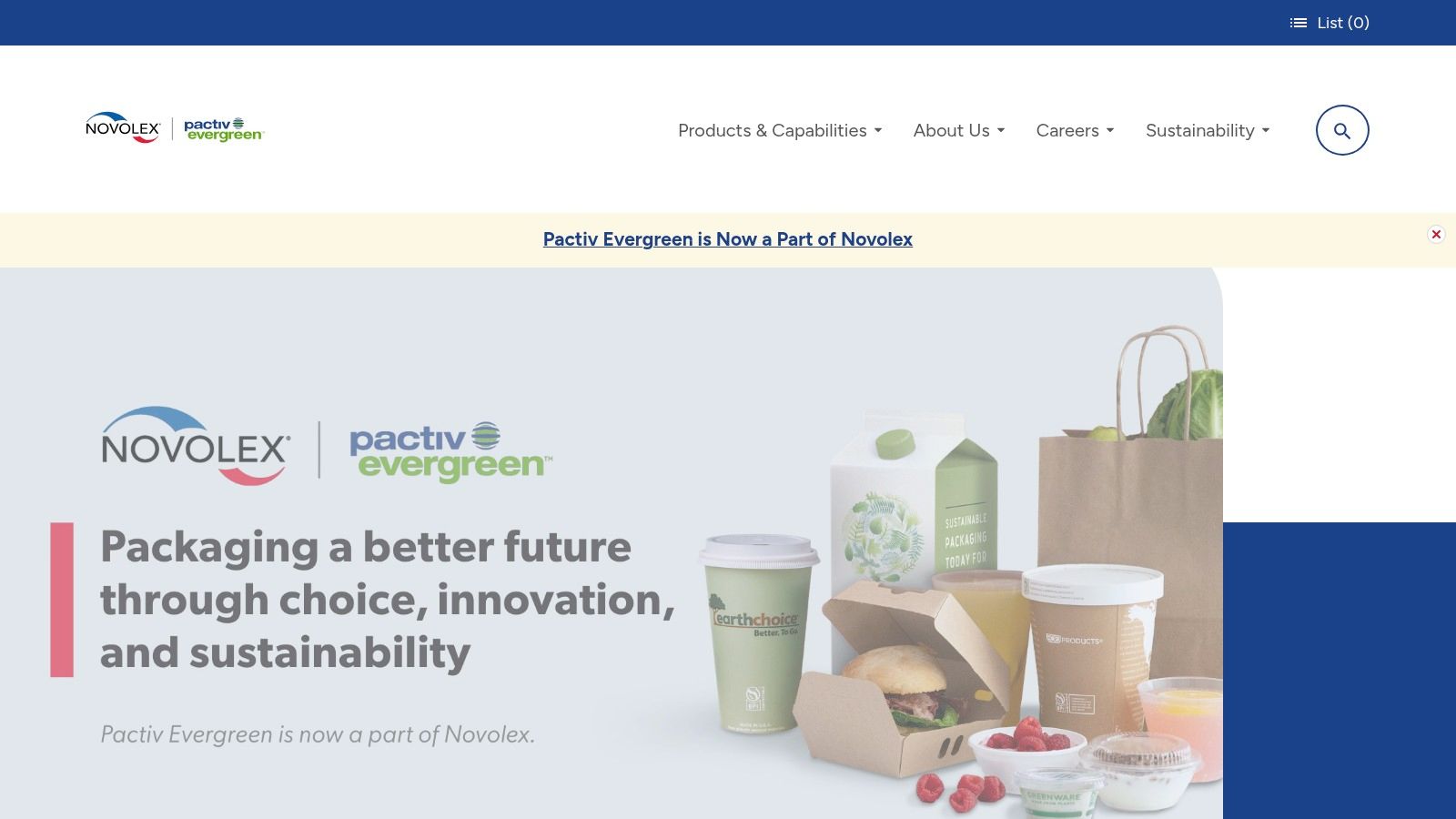
One of the key strengths of Earth Essentials is its commitment to using post-consumer recycled materials and renewable fibers. This directly contributes to reducing waste and promoting a circular economy. Molded fiber technology, a standout feature of the line, creates strong yet lightweight containers, offering a sustainable alternative to traditional plastic packaging. The availability of both recyclable and compostable options further enhances its eco-friendly profile, catering to different disposal methods and local infrastructure. Critically, all materials are food-safe and meet FDA requirements, ensuring the safety and integrity of the packaged food. The diverse sizing options available cater to a broad spectrum of food applications, from individual portions to bulk quantities.
For businesses operating in the organic, clean-eating, and health-conscious food sectors, Earth Essentials packaging resonates strongly with consumer values. Using recycled and renewable materials aligns with the ethos of reducing environmental impact and promoting sustainable living. The availability of compostable options further appeals to zero-waste advocates and consumers committed to minimizing landfill waste. The emphasis on food safety, combined with the sustainable packaging choices, makes Earth Essentials a compelling option for businesses targeting health-conscious and eco-minded consumers.
The advantages of using Pactiv Evergreen Earth Essentials packaging are numerous. The use of post-consumer recycled content directly contributes to waste reduction efforts. The structural integrity of the molded fiber containers is particularly noteworthy, making them suitable for even heavy food items. Pactiv Evergreen's established supply chain and wide availability ensure ease of access for businesses of all sizes. Furthermore, the competitive pricing of Earth Essentials makes sustainable packaging a financially viable option. While precise pricing information isn't publicly available, Pactiv Evergreen encourages businesses to contact them directly for tailored quotes based on specific needs and order volumes. This personalized approach allows for optimized pricing strategies.
However, some limitations should be considered. While many products within the Earth Essentials line are compostable, some are only recyclable. This necessitates awareness of local recycling infrastructure and capabilities. Furthermore, the heat resistance of these sustainable options may be lower compared to traditional plastic alternatives, potentially limiting their use for certain hot food applications. Additionally, some materials, particularly those made from molded fiber, may absorb liquids over extended periods, making them less suitable for liquid-based foods without additional liners.
Compared to other eco-friendly food packaging options like biodegradable PLA plastics or bagasse containers, Earth Essentials offers a balance of strength, availability, and price. While PLA plastics offer excellent clarity and heat resistance, their compostability is often limited to industrial composting facilities. Bagasse, while compostable, may not offer the same structural strength as molded fiber. Earth Essentials' combination of recycled content, strength, and diverse product range makes it a versatile and practical solution for a wide range of food packaging needs.
Implementing Earth Essentials into your business is straightforward. Start by visiting the Pactiv Evergreen website (https://www.pactivevergreen.com) and exploring the Earth Essentials product line. Consider the specific requirements of your food products, such as size, weight, and temperature sensitivity. Contact Pactiv Evergreen directly to discuss your needs and receive tailored recommendations and pricing. They can guide you through the selection process and ensure the chosen packaging aligns perfectly with your products and sustainability goals. Transitioning to Earth Essentials can be a seamless process, allowing you to enhance your brand's eco-friendly profile and resonate with environmentally conscious consumers. By choosing Earth Essentials, businesses can actively contribute to a more sustainable future while providing their customers with high-quality, eco-friendly packaged food products.
8. Footprint Plant-Based Food Packaging Technology
In the pursuit of truly eco-friendly food packaging, Footprint Plant-Based Food Packaging Technology stands out as a promising innovator. This company is tackling the pervasive problem of plastic pollution in the food industry by developing advanced plant-based alternatives. Utilizing proprietary fiber technology, Footprint creates packaging solutions that are not only renewable and compostable but also durable enough to handle the demands of modern food applications, from steaming hot microwave meals to on-the-go beverage cups. Their commitment to creating sustainable solutions makes them a significant player in the movement towards a more eco-conscious food system.
Footprint's strength lies in its innovative molding technology. This allows them to create packaging from plant fibers that is both moldable and heat-resistant, a combination often lacking in traditional plant-based alternatives. This unique capability opens doors for replacing plastic in applications where heat resistance is crucial, such as microwaveable meals, ready-to-eat containers, and even oven-safe dishes. Imagine reheating your leftovers without contributing to the mountains of plastic waste – Footprint makes this a reality. Furthermore, their plant-based barrier coatings provide excellent moisture and grease resistance, ensuring the packaged food stays fresh and protected. This addresses a key concern for food manufacturers and consumers alike, as maintaining product integrity is paramount.
The customizability offered by Footprint's molding process adds another layer of appeal. The ability to create packaging in a variety of shapes and sizes provides flexibility for various food products and branding needs. From single-serve portions to family-sized meals, the technology adapts to the specific requirements of the food being packaged. This versatility makes it an attractive option for businesses seeking sustainable packaging solutions that don't compromise on functionality or aesthetics.
While Footprint's technology presents a compelling case for sustainable packaging, understanding the practical implications is crucial. Although specific pricing information isn't readily available, it's important to acknowledge that plant-based packaging often comes with higher manufacturing costs compared to conventional plastic. This is a common hurdle for many eco-friendly alternatives. Additionally, as a relatively newer technology, Footprint's production capacity is still scaling up, which can lead to longer lead times for businesses looking to implement their solutions. Planning ahead and factoring in potential delays is essential for seamless integration.
Compared to other plant-based packaging options, Footprint's technology offers superior heat resistance, making it suitable for a wider range of applications. While some alternatives might perform well for cold or ambient temperature products, they often fall short when exposed to heat. Footprint’s ability to withstand high temperatures positions it as a viable replacement for plastic in scenarios where other plant-based materials simply can't compete. This advantage is particularly relevant for businesses seeking to eliminate plastic from their entire product line.
Implementing Footprint’s packaging solutions requires careful consideration. Businesses should engage with Footprint directly to discuss specific product needs and lead times. Understanding the technical requirements, such as recommended storage conditions, is essential for maintaining the integrity of the packaging and ensuring product freshness. While most of Footprint’s packaging is recyclable in standard paper recycling streams, certain formulations might have specific composting requirements. Clarifying these details upfront ensures proper disposal and maximizes the environmental benefits.
Despite the higher initial costs and limited production capacity, Footprint Plant-Based Food Packaging Technology holds immense potential for transforming the food packaging landscape. Its superior heat resistance, customizability, and commitment to recyclability position it as a leading solution for eco-conscious businesses. By embracing this technology, food brands and retailers can significantly reduce their reliance on plastic and contribute to a more sustainable future. For the target audience concerned with environmental impact and healthy living, supporting businesses that utilize Footprint's packaging aligns perfectly with their values. As this technology continues to develop and scale, it promises to become an increasingly accessible and impactful solution in the ongoing quest for eco-friendly food packaging. You can explore their solutions further at https://www.footprintus.com.
Eco-Friendly Food Packaging Comparison
| Product | Core Features & Materials | User Experience & Quality ★ | Value & Price 💰 | Target Audience 👥 | Unique Selling Points ✨ |
|---|---|---|---|---|---|
| 🏆 Naked Pantry | 100% plastic-free; compostable paper, glass, metal; US-grown organic | High quality, fresh, organic ★★★★ | Subscription model; pricing varies 💰 | Health-conscious & eco-friendly 👥 | Zero plastic from supplier to door; organic focus ✨ |
| Bio-Based Compostable Containers | Plant-based (bagasse, PLA, wheat straw); compostable certified | Durable, heat resistant ★★★ | Competitive pricing 💰 | Foodservice, eco-conscious businesses 👥 | Certified compostable; variety of sizes ✨ |
| Notpla Seaweed-Based Packaging | Edible seaweed; biodegradable in 4-6 weeks | Innovative, rapid biodegradation ★★★★ | Higher cost 💰 | Eco-innovators; niche food brands 👥 | Edible packaging; seaweed material ✨ |
| Eco-Products Compostable Packaging | Renewable corn, sugarcane, recycled paper | Strong, reliable ★★★★ | Price premium 💰 | Foodservice, sustainability-driven 👥 | Wide product range; custom branding ✨ |
| TIPA Compostable Flexible Films | Plant-based biopolymers; compostable films | Plastic-like feel, excellent barrier ★★★★ | Higher cost 💰 | Food packaging manufacturers 👥 | Plastic-like performance; heat-sealable ✨ |
| Vegware Plant-Based Packaging | Corn starch, sugarcane; compostable | Good heat resistance ★★★ | Price premium 💰 | Foodservice, European market focus 👥 | Broad range, printing options, compostable standards ✨ |
| Pactiv Evergreen Earth Essentials | Recycled & renewable fibers; recyclable options | Strong, lightweight ★★★ | Competitive pricing 💰 | Foodservice & retail 👥 | Uses recycled content; strong structural integrity ✨ |
| Footprint Plant-Based Technology | Proprietary fiber molding; heat-resistant | Superior heat resistance ★★★★ | Higher manufacturing costs 💰 | Microwaveable food brands, retailers 👥 | Microwave-safe; recyclable in paper streams ✨ |
Choosing the Right Eco Friendly Packaging
Transitioning to eco friendly packaging for food is paramount for a sustainable future. From compostable containers and seaweed-based pouches to plant-based films and renewable options, the tools discussed – Naked Pantry, World Centric, Notpla, Eco-Products, TIPA, Vegware, Pactiv Evergreen, and Footprint – offer diverse solutions for businesses and individuals striving for greener practices. The key takeaway is that the "perfect" eco friendly packaging depends on your specific needs.
Consider these crucial factors when making your choice: Does the material align with your existing waste management system (compostable, recyclable, etc.)? Is the source material sustainably harvested and produced? Will the packaging adequately protect your food product? For example, a restaurant serving takeout might prioritize compostable containers from World Centric or Vegware, while a company shipping dry goods could explore TIPA's compostable flexible packaging. A small business or individual focusing on reducing packaging altogether might find Naked Pantry's zero-waste grocery delivery service a perfect solution.
By carefully evaluating these tools and considering your unique requirements, you can make a meaningful impact on reducing plastic waste and embracing environmentally responsible practices. Every conscious choice moves us closer to a healthier planet. Want to experience the ultimate in zero-waste grocery shopping? Explore Naked Pantry and discover a convenient way to reduce your environmental footprint by receiving your groceries package-free.
